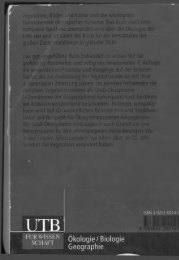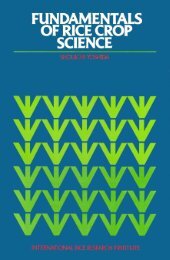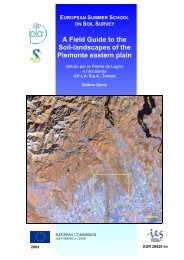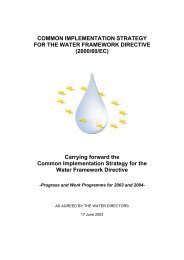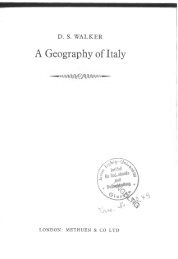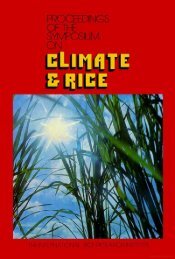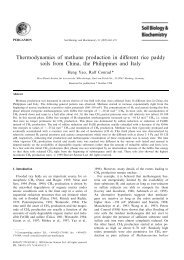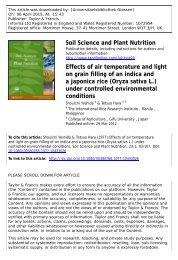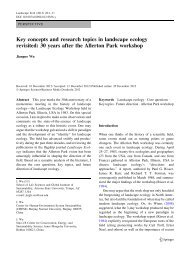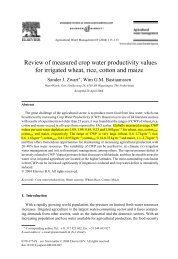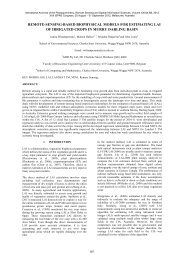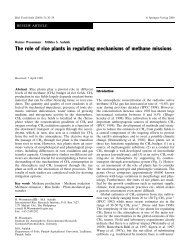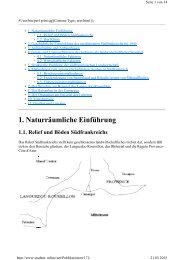Sustainability of European Irrigated Agriculture under Water Framework Directive and Agenda 2000
Sustainability of European Irrigated Agriculture under Water Framework Directive and Agenda 2000
Sustainability of European Irrigated Agriculture under Water Framework Directive and Agenda 2000
Create successful ePaper yourself
Turn your PDF publications into a flip-book with our unique Google optimized e-Paper software.
THE SUSTAINABILITY OF EUROPEAN IRRIGATED AGRICULTURE<br />
Figure 4.2. Possible Futures, based on Foresight (DTI, 1999)<br />
Social values<br />
Globalization/<br />
interdependence<br />
Governance<br />
Consumerism/<br />
individualism<br />
World<br />
Markets<br />
Global<br />
<strong>Sustainability</strong><br />
Local<br />
Stewardship<br />
Conservationism/<br />
Community<br />
Present<br />
Regionalization/<br />
autonomy<br />
World Markets are characterised by an emphasis on private consumption <strong>and</strong> a highly<br />
developed <strong>and</strong> integrated world trading system.<br />
Global <strong>Sustainability</strong>: is characterised by more pronounced social <strong>and</strong> ecological values,<br />
which are evident in global institutions <strong>and</strong> trading systems. There is collective action to<br />
address social <strong>and</strong> environmental issues. Growth is slower but more equitably distributed<br />
compared to the World Markets scenario.<br />
Provincial Enterprise is characterised by emphasis on private consumption but with decisions<br />
made at national <strong>and</strong> regional level to reflect local priorities <strong>and</strong> interests. Although market<br />
values dominate, this is within national/regional boundaries.<br />
Local Stewardship is characterised by strong local or regional governments which emphasise<br />
social values, encouraging self-reliance, self sufficiency <strong>and</strong> conservation <strong>of</strong> natural resources<br />
<strong>and</strong> the environment.<br />
This scenario framework can be adapted to provide an analytical framework within which to<br />
explore <strong>European</strong> agricultural <strong>and</strong> water policy options as they affect irrigation.<br />
3. AGRICULTURAL POLICY –SCENARIO BUILDING<br />
Drawing on the aforementioned framework, a number <strong>of</strong> Agricultural Policy Scenarios are<br />
constructed which reflect variations in the type <strong>and</strong> extent <strong>of</strong> support to the farming sector.<br />
Particular reference is made to <strong>Agenda</strong> <strong>2000</strong> Reform <strong>of</strong> the Common Agricultural Policy<br />
(CAP), the CAP mid-term review proposals <strong>and</strong> future prospects for agricultural commodity<br />
markets, including those for irrigated crops.<br />
The WADI project focuses on changes in EU-15 agricultural policy as they affect the<br />
economic, social <strong>and</strong> environmental performance <strong>of</strong> irrigation in the partner countries. Table<br />
4.1 links the Foresight Scenarios with scenarios for agricultural policy, together with a brief<br />
description <strong>of</strong> the agricultural policy regime. The Baseline is taken as the agricultural policy<br />
regime in place in <strong>2000</strong>/1, as determined by CAP at that time. This <strong>2000</strong>/1 baseline is used to<br />
provide a relative reference point for the definition <strong>of</strong> future scenarios. The Baseline is also be<br />
extrapolated to 2010 based on predictions (rather than possibilities) <strong>of</strong> agricultural markets<br />
<strong>and</strong> prices from EU, OCDE <strong>and</strong> other sources. This extrapolation is referred to as the<br />
42



